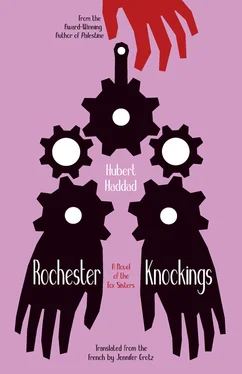In the grand auditorium of the New York City Academy of Music, the stampede released into the stairways and halls worried the staff of this institution more accustomed to the airy gait of music lovers. Behind the scenes, trying to get a count of heads coiffed or not, Franck Strechen was rubbing his hands together. This was a turnout to dream of, an audience of great opportunity, even if it augured no future, given the poor state of his contractual associate. At least she was abstaining for the moment and letting herself be made up, ready it seemed to demonstrate being a medium with physical effects according to the rules: they could expect some classic conversations with the table, experiences of directed writing from afar, and of Ouija according to the upside-down-glass technique, as well as some levitation exercises using a single support, partial materialization by densification of the astral body and, perhaps, contributions from the afterlife, a bouquet of flowers or an old Bible, given all the stage equipment Margaret Fox-Kane had taken the time to spread out before the doors opened. Closets, diversions, miraculous escapes: they were all the rage! He was worried only about the effects of the trance on her weak constitution, for he had never doubted the excessive nervous energy Margaret channeled, as much for conjuring tricks as for the embodiment of spirits.
Still camped behind the stage curtain, Franck Strechen began to closely scrutinize the first rows: everyone was there! The spiritualist crème de la crème of New York. He recognized, among other luminaries more or less documented, the unpredictable William Mac Orpheus, Thomson Jay Hudson behind his martial handlebar mustache, clairvoyant mediums from the hinterlands, mediums of Christ more dangerous than the Medusa, a quantity of orderlies from spiritualist organizations, and the most faithful of the faithful, Andrew Jackson Davis in the flesh. The yellow, white, or black faces mingled noisily throughout the auditorium. A candid mass of uncontrollable instincts, the curious people — unusual amateurs, spellbound by principle, enthusiastic laymen — were to be feared more in the case of defeat.
A spectacle had been expected, no doubt, but the announcement, a tad bit sensational, added some spice to the event:
Modern Spiritualism
exposed for the first time
by one of the Fox Sisters
The tremor behind the curtain didn’t escape the notice of a spectator from the two-dollar seats who had slipped in between two blind cohorts. So tiny, unrecognizable, Kate Fox-Jencken hid unnecessarily beneath a floppy hat with folded edges and black veils despite the stifling heat. Hours earlier, checking the hallways, offices, emergency exits, she had tried unsuccessfully to reach her sister to beg her not to put herself into peril. The bottled-up negative energies that they had released without the crowd’s knowledge had accumulated to their own loss. Kate was convinced of this ever since her despoilment by the law; after a rebellious and struggling time, she remained concealed in the shadows. It was necessary that she protect herself from a universal conspiracy. Diverted by Leah, the obsessive little fears of Hydesville had taken on a crazy amplitude, disturbing all the dead in cemeteries, channeling millions of slaves to their devotion. Soon the spirits would overwhelm the living. What might happen then surpassed all understanding. .
Wearing a dark dress with a headband in her hair, Margaret greeted the room after the presenter’s disclaimer: it was necessary to observe a religious silence conducive to demonstrations. Very pale in her medium’s cabinet reconstituted for the stage, she initially produced the expected effects: various noises and knocks, the movement of objects, the spontaneous combustion of a sheet scrawled with the directed writing in a closed and locked cabinet. One moment she even seemed to take up spiritual telegraphy, her eyebrows frowning as she invoked Benjamin Franklin and Abraham Lincoln. Then, standing up to face the audience gratified to applaud her, she announced there would be an exceptional second component to her presentation.
To everyone’s amazement, she then said very calmly: “Spiritualism is from one end to the other a deception. It is the biggest fraud of our century. Kate Fox and I embarked on this adventure while still little girls, much too young and innocent to understand what we were truly dealing with, the two of us propelled on this path of deception by unscrupulous adults. .”
“That’s shameful! She’s crazy!” someone exclaimed from the front rows.
Before the rumblings and indignant exclamations had time to discourage her, Margaret, back at her cabinet, undertook a demonstration of each of her turns. Calmly, she began to deconstruct for all to see all the phenomena of conjuring and apparitions. Then she revealed her method of knocking by exposing a sounding board installed under her feet and a quantity of compartments under the table top. Barefoot, she cracked her toes together to produce the desired sounds. She proceeded with a clinical determination, as if reconstituting a crime scene. Her slowed-down gestures and the extraordinary expressiveness of her face substituted for paranormal manifestations with a power that seemed even greater. A deathly silence fell over the stunned audience. There was nothing more to see. The theater of the Fox sisters was forever destroyed. “It’s madness, a well-planned suicide,” was whispered from one part or another. Strangely, the crowd left the Academy of Music in the biggest calm, as if at the end of some funeral ceremony.
Outside, on the twilit square where the blue lights of the gas lamps danced, people dispersed with lowered heads, not looking at each other, some toward public transportation, whereas others, impatient despite the mildness of the air, waited in the endless line for their horse-drawn carriages. An old man still alert, with large shoulders, showing a slight limp in the weakness of a hip, appeared to be looking around for somebody and, suddenly raising an arm to a retreating figure, walked as quickly as he could in its direction. Kate found herself caught in a narrow and badly lit street when the individual reached her.
“How you run, wait up!” he said. “Don’t be afraid, I recognized you in the stairway of the Academy of Music, wait!”
As the silent shadow went on her way, William Pill, alias Mac Orpheus, placed himself firmly in front of her, blocking her from every direction, and gazed at her, overwhelmed to find again through the wrinkles of the years the face of a Hydesville girl.
“We knew each other well,” he said, “don’t you remember?”
“Yes, yes,” Kate murmured, “but let me go.”
“Why did your sister do that? Do you know?”
“I don’t know anything about it, it’s her problem, now let me leave. .”
He stepped aside without leaving her, limping alongside her. Kate gave the impression of hardly being aware of his presence. Looking like a raw-boned elf under her veils, she seemed to move outside all reality, in some parallel world where things were perfectly identical, although of a different substance.
They passed vagabonds, puzzled women smoking along shop windows, drunkards in the grip of their demons. Out of breath, misty-eyed, William Pill wondered over the strangeness of this little woman who, despite their lack of acquaintance, was the source of his good fortune. Thanks to her, he had become rich enough to be honest, from his point of view, and had met his angel, the fickle love of his life, a damn bluestocking fled today to Rochester with a trunk of books.
“Were you ever loved, Kate?” he couldn’t help but stammer, seized by that uncontrollable emotion of old men.
As she remained silent, he gently took her arm and, while walking, leaned toward her ear.
Читать дальше












